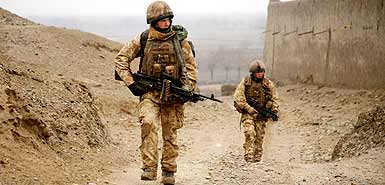Bearing brunt of two wars is hurting family life

The research involved more than 24,000 military personnel
Britain’s ability to sustain campaigns in Iraq and Afghanistan was called into question last night as it emerged that almost half of all military personnel are ready to quit.
The first survey to assess attitudes across the Armed Forces reveals unprecedented levels of concern over equipment, morale and pay.
The research was conducted by the Ministry of Defence and involved more than 24,000 military personnel.
It found that the sense of overcommitment means that 47 per cent of soldiers and army officers think regularly of handing in their resignations.
Patrick Mercer, Conservative MP for Newark and a former commanding officer, said that the findings reflected the duress under which military personnel were operating. “I think the tempo of operations has produced such a level of stress on the families that it is no wonder so many are thinking of leaving,” he said.
The report highlights the pressures on the Armed Forces of enduring two medium-scale military campaigns simultaneously. Returning for second and third tours, particularly in Afghanistan where the Taleban are in resurgent mood, has had a significant impact on families.
The same sense of overstretch is reflected across all three Forces, and 45 per cent of those questioned admitted they were not happy with the level of separation from family and friends.
Asked whether they regularly considered leaving, 47 per cent of soldiers and officers in the Army said that they did. The same percentage of Royal Navy personnel agreed, along with 37 per cent in the Royal Marines and 44 per cent in the RAF. The Regular Army is already 5,000 soldiers short and experienced young officers are leaving at an increasing rate.
The survey was carried out between July and October last year, a time when 20 Service personnel were killed in Afghanistan and 15 in Iraq.
Casualty figures in Afghanistan have remained high. A total of 110 have died since November 2001, including 24 so far this year, most by roadside bombs and mines. In Iraq the death toll is 176, with two killed this year. The British, Americans and Canadians have borne the brunt of casualties in Afghanistan.
Dissatisfaction with equipment and resources was also a common theme, reflecting the criticisms voiced by coroners. Andrew Walker, the assistant deputy coroner for Oxfordshire, has attacked the MoD numerous times during soldiers’ inquests for failing to provide enough of the right equipment to protect the troops.
The research revealed contrasts in morale. Individual personnel appeared to enjoy high morale, but the perception of morale as a whole in their particular Service was poor.
In the Army, 59 per cent of those questioned rated the level of morale as “low” or “very low”. In the Royal Navy it was 64 per cent and the Royal Marines 38 per cent. The worst perception of morale was in the RAF, where 72 per cent of those asked thought that morale was low.
Vice-Admiral Peter Wilkinson, Deputy Chief of the Defence Staff (personnel), said that 15,000 military personnel were committed to operational theatres in Iraq, Afghanistan and the Balkans in mid-2007, with a further 15,000 deployed on other military tasks around the world and in Royal Navy and Royal Fleet Auxiliary ships.
He said that pay and disturbance money – known as the X factor – had risen and living accommodation had improved and that it was in this context that the tri-Service attitude survey had been carried out.
However, personnel appeared not to be satisfied with the improvements. Asked if they were satisfied with the 13 per cent increase in the X factor as a way of compensating for working conditions, 64 per cent of the Army said “no”. The figures were higher in the Royal Navy, Royal Marines and RAF.
Asked whether the frequency of tours had an impact on whether to leave the Services, 47 per cent of the Army said that it made no difference; 38 per cent said it increased their intentions to leave. The figures were roughly similar for the other Services.
The MoD said that the research had revealed “areas of concern”. It said that a number of measures had been introduced, including tax-free operational allowances for those serving six-month tours and pointed out that about two thirds of the personnel surveyed thought that the current frequency of operational tours was “about right or not enough”.
July 10, 2008
Michael Evans, Defence Editor
Source: The Times